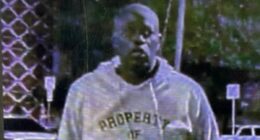Share this @internewscast.com
A Polish woman, who has stirred controversy by claiming to be Madeleine McCann, has been described as “cruel and unforgiving” in her alleged torment of the missing girl’s parents, according to a barrister’s remarks in court.
Julia Wandelt has been characterized as a “woman of considerable intelligence” capable of being “extremely manipulative,” as stated by prosecutor Michael Duck KC.
Prosecutor Duck dismissed Wandelt’s DNA ‘evidence’, which she used to assert her identity as Madeleine, calling it “wholly irrelevant and a complete nonsense.”
These comments were delivered during Duck’s closing argument at Leicester Crown Court on Monday, where 24-year-old Wandelt faces charges of stalking Kate and Gerry McCann.
The court heard that starting from June 2022, Wandelt made persistent efforts to convince others she was Madeleine, inundating the McCanns with calls, emails, and texts, and even appearing at their residence to request a DNA test.
Wandelt, along with her co-defendant, 61-year-old Karen Spragg from Cardiff, has denied the charges.
In his speech, Mr Duck said Wandelt had caused ‘very significant distress’ to Mr and Mrs McCann by both by approaching them directly and when that failed, through their own children and friends and associates.
Mr Duck said: ‘This case is about Julia Wandelt and Karen Spragg individually and subsequently as a team causing very significant distress to Kate and Gerry.’
He said the messages and calls and the visit to the McCanns’ home showed the ‘ends to which these two ladies would go to make sure they reached their targets … and imposed their will upon them.’
Referring to the visit to the McCanns house in Rothley, Leicestershire, in December 2024 in which Mrs McCann can he heard in a recording saying: ‘You are causing a lot of distress stop it’, he said it could not have been ‘clearer in plain English’ that they were.
In the recording, Wandelt can be heard telling Spragg ‘don’t shout at Kate’ which Mr Duck said was an ‘early and overwhelming demonstration that Mrs Spragg ‘wasn’t just a hanger on but an enthusiastic encourager’.
He said they ‘wanted to impose their will on the McCanns’ and ‘knew what they were doing was wrong’.
Mr Duck said they were ‘standing on the drive of that couple whose daughter remains missing almost two decades later, making a positive assertion that one of the people speaking is their daughter despite the absence of evidence to support that contention and refusing to leave.’
He asked the jurors to ‘imagine arriving back at your home address in the dark… and then being approach in the manner that you have seen and heard on that tape’ adding: ‘You may think that distress is blindingly obvious.’

Julia Wandelt, 24, is accused of bombarding Kate and Gerry McCann with calls, emails and texts and turning up at their home asking for a DNA test.

She is in the dock alongside co accused Karen Spragg, 61, of Cardiff, who also denies stalking
He said a letter Wandelt sent to Mrs McCann in which she wrote: ‘Dear Mom’ was ‘unnerving’ and that it was a ‘cruel and unforgiving and demonstration that this [the stalking] was not going to stop’.
Mr Duck said that while Wandelt had been described during the trial as ‘vulnerable’, ‘You may take the view that she is a lady of some considerable intelligence and is capable of being extremely manipulative.’
He said: ‘She set out on a course for reasons best known to herself and she demanded a resolution that was to be on her own terms and if anyone was to take a contrary opinion, and they they did, she simply rode roughshod over those views and continued with her endeavors.’
Spragg, he said, ‘joined in very much as a willing participant, not as some sidekick’ and was ‘cruel and vitriolic towards the McCanns’.
Mr Duck said both defendants had ‘dropped their guard and demonstrated their very real animosity towards the McCanns’ who were simply ‘parents desperate to resolve the mystery of the disappearance of their daughter.’
He said Wandelt ‘sought to dilute that antipathy towards the McCanns as cynically it suited her purpose.’
Mr Duck said: ‘I am going to suggest, and I don’t apologise for it, that they each were manipulative and capable of being so and determined in the manner in which they achieved their aims.’
He said Wandelt’s DNA ‘evidence’ was ‘wholly irrelevant and a complete nonsense’ and they both ‘knew of the consequences and chose to ignore it and carry on doing what they wanted’.
He said the case has ‘nothing to do with the genuinely held belief by Julia Wandelt that she was Madeleine McCann.’
‘The evidence doesn’t and never has been able to support that suggestion… and yet Julia Wandelt and those who continue to support her continue to pursue that very narrative,’ he told the court, adding she simply ‘refuses to accept the scientific evidence.’
Discussing childhood memories Wandelt claimed to have had, Mr Duck said ‘you may think again is a very cruel message to Kate McCann who was desperately hoping for the return of her daughter nearly two decades on.’
He said Wandelt got some of the detail provided in her ‘memories’ from home videos online at which point she started crying loudly and shouted: ‘It’s not from home video’.
She could be heard shouting and crying in the corridor before returning to court a short time later.
Mr Duck said the memories she claimed to have were ’emotional manipulation of the first order’.
Earlier, the judge Mrs Justice Cutts, urged jurors to put any emotions or sympathies with Mr and Mrs McCann to one side before considering verdict.
She told them: ‘There will be few if any of you who have not heard about the disappearance of Madeleine McCann in 2007.’
She said the case may cause feelings of sympathy for the McCanns or the defendants, or for both.
But said: ‘Put feelings of sympathy to one side. Emotion of any kind does not assist in deciding whether the allegation against each defendant is satisfactorily proved.’
Jurors also heard Spragg’s defence, which consisted solely of a statement from her best friend.
Jurors were read a brief statement on Monday morning from Susan Ahern, a care worker.
Ms Ahern said: ‘I have known her for 40 years and I’m proud to be able to write a character reference for her.
‘She has been a true friend to me with her kindness and always willing to be there for me in the good times and the bad.
‘She is sincere, reliable and most definitely honest.
Ms Ahern said she was a ‘true, genuine and compassionate person’ and was ‘proud to have her as my best friend’
After reading the short statement, Spragg’s barrister Simon Russell Flint KC said: ‘And that my lady, is the case for Mrs Spragg’.
The trial, now in its fifth week, continues.

















